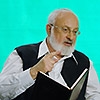The Times of Israel published my new article “Today’s Challenges to Jews and the Lack of Leadership”

The future of the Jewish nation is at stake. Has the time come for a “modern-day Moses” for the Jewish people—a leader, a group, or a movement that will pave the way to unity in the face of the current divisions and conflicts? A type of advance-squadron leadership who addresses the most pressing issues affecting the Jews in the Diaspora and Israel, and bridges the gaps between them?
Internal fragmentation and divisiveness, apathy, assimilation and anti-Semitism are only a few of the Jewish world’s challenges. These problems are clearly evident, but no one is stepping up with solutions or feasible plans to effectively address these issues, which could rapidly escalate and threaten our very existence. We are too busy squabbling with each other while our enemies unite forces against us.
In Europe, anti-Semitism has reached such levels that Jews have been warned not to wear kippot in public for fear of being violently attacked. In Britain, anti-Semitic incidents hit record highs for the second consecutive year with over 100 new cases being recorded every month by watchdog groups. In Germany, a country that previously enforced among the toughest legislation in the world prohibiting the use of Nazi symbols, recently lifted that ban for computer games. The sale of neo-Nazi merchandise and neo-Nazi gatherings at music festivals are no longer taboo. In the US alone, 3,023 incidents of anti-Semitism were reported in 2017 – 2018, the highest level in two decades, according to the Anti-Defamation League (ADL).
Meanwhile, there is a growing rift between American Jews and Israelis. A significant shift is taking place in the younger generation of American Jews’ views about what it means to be Jewish. Thus, one of the greatest concerns of American Jewry is maintaining the Jewish identity of the next generation, and the memory of the Jewish people, to help avoid existential risks to the Jewish people.
In order to champion these challenges, we need leadership capable of renewing our ideological foundation as a united people. Such leadership should elevate us to the level of unity and mutual responsibility that was once achieved and taught by our patriarch Abraham to the small group called “Israel” before we descended into unfounded hatred, the source of all our troubles and miseries. Very simply, when we unite—not erasing our differences, but rising above them—we succeed and flourish, and our leadership should be predominantly concerned with realizing this principle.
We should aspire to a new leadership capable of learning the principles of the ancient wisdom of Kabbalah, and which can explain how humanity is connected as one integral system. We need leadership that will demonstrate how the Jewish people is a microcosm of the world, a small replica reflecting the whole of humanity, and which can guide us step-by-step in making significant positive changes toward connection and mutual understanding.
The 20th Century’s most renowned Kabbalist, Rav Yehuda Ashlag (Baal HaSulam), wrote in his “Introduction to the Book of Zohar“: “Bear in mind that in everything there is internality and externality. In the world in general, Israel, the descendants of Abraham, Isaac and Jacob, are considered the internality of the world.” That internal force can be activated in the Jewish people through our connection. It is what the nations of the world subconsciously want from us, dwelling deep within as the core reason behind every expression of anti-Semitism.
Rav Abraham Isaac Kook also emphasizes the importance of our role in his writings Orot (Lights): “Israel is the essence of all existence, and you have no movement in the world, in all nations, which you will not find in Israel.” As our sages convey, our Jewish role is not optional. We are responsible for everything that happens in the world, for better or for worse. It is difficult to understand because we don’t immediately feel it, but with the help of wise leadership that knows how to make this reality plain and accessible to everyone, we will come to see that this is how the system of human connection is structured at a deeper level. Instead of the current state of reacting with knee-jerk responses to hardships and dangers, a wise leadership would prevent such situations from developing in the first place, establishing our unity as our inviolable safeguard.
With the High Holidays approaching, we have a tremendous opportunity for renewal. Now is the time for a leadership that will guide us to achieve the level of “love your friend as yourself” and by doing so, become a “light unto the nations.” This will require a massive educational campaign calling for unity and togetherness. At the time when we achieve the goal of connection, instead of more divisions, conflicts and threats, we will be able to proclaim a true Rosh HaShanah, the beginning of a new year of unity, peace and tranquility for all.
[232407]
Filed under: New Publications - No Comments →
 Question: What advice can a Kabbalist give to build a successful connection between parents and children?
Question: What advice can a Kabbalist give to build a successful connection between parents and children?










